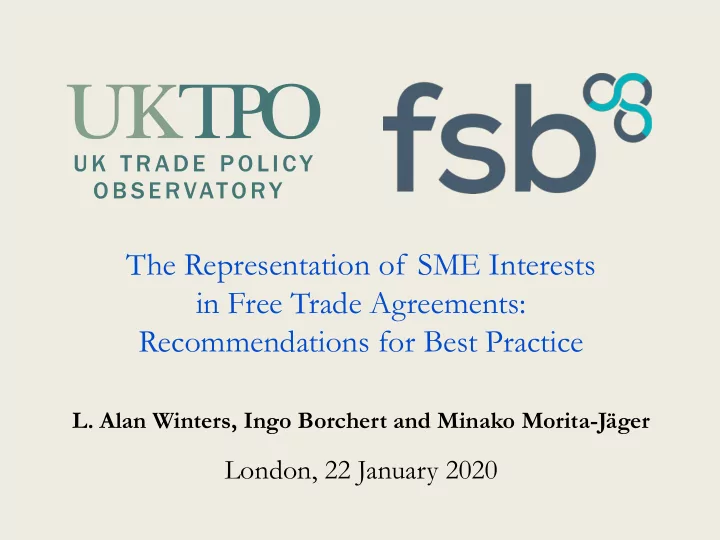

The Representation of SME Interests in Free Trade Agreements: Recommendations for Best Practice L. Alan Winters, Ingo Borchert and Minako Morita-Jäger London, 22 January 2020
SMEs and International Trade Trade participation of SMEs lower compared to larger businesses, because trade costs disproportionately affect SMEs New avenues for SMEs’ internationalisation: digitisation, GVCs How can Free Trade Agreements (FTAs) help? Reduce barriers of a fixed cost nature Provide long-term planning security Help overcome lack of information Reduce variable trade costs such as tariffs 2
SMEs and International Trade FSB survey: importance of FTA regions for SME exporters over the next three years: 3
SMEs and International Trade FSB Survey: top five countries most commonly reported ‘important’ destination markets for SME exporters over the next three years: 4
SME Provisions in FTAs Review of best practice regarding SME provisions in recent major FTAs: CPTPP and EU-Japan EPA Best in class in terms of scope, structure and depth with regard to SME support Focus on four important areas: 1. E-commerce, 2. Treatment of intellectual property rights (IPRs), 3. Trade facilitation and 4. ‘Small Business Chapter’ and remit of SME Committee 5
(1) SMEs and E-Commerce Digital trade, directly or via online platforms, crucial for connecting to overseas markets and customers Prohibition to levy customs duties on electronic transmissions Consider SME constraints when formulating conditions for compliance with cross-border data flow regime Requirement for any E-commerce Committee to consider SME interests − CPTPP: cooperation clause for SME support without formal structure − USMCA: e-commerce issues under non-exclusive purview of SME Committee 6
(2) SMEs and IPRs Protection and enforcement of IPRs very important for SMEs Trade in digital products and some services rely heavily on IP Provisions that ease registration, maintenance and protection of IPRs (eg. trademarks, GIs, designs) of vital interest to SMEs − CPTPP requires national treatment of IPRs and provides for civil, criminal and border enforcement of IPRs Enforcement/dispute settlement must be accessible and efficient for small businesses − Co-operation between FTA signatories should be obligatory rather than based on ‘best endeavour’ approach 7
(3) SMEs and Trade Facilitation SMEs often cannot reap market access benefits of TF because of fixed costs of accessing technological solutions Simplification and harmonisation of customs procedures Accreditation regimes from ‘trusted trader regimes’ in FTAs should be accessible to SMEs − High de minimis thresholds for duty exemption to benefit SMEs engaged in e-commerce; EU-Japan on customs simplification for SMEs Obligation for Single Window arrangement − CPTPP includes best endeavour approach for facility to electronically complete all import/export requirements at single entry point 8
(4) Small Business Chapter SME support to be institutionally hard-wired into FTA: Future FTAs should establish dedicated SME Committee − Government and private sector representation − Meaningful say in all areas affecting trading prospects of SMEs − USMCA: ‘Trilateral SME Dialogue’ as stakeholder forum SME Contact Point as a one-stop-shop, information sharing − Both CPTPP and EU-Japan EPA offer very useful websites − EPA Helpdesk: advisory services on internationalisation of SMEs Value of such SME provisions will hinge on more ambitious use of obligatory language instead of ‘best endeavour’ 9
Conclusions Most effective way of specifically enabling SMEs to trade is for FTA to address trade barriers that represent fixed costs − Provisions to unlock benefits of trade facilitation for SMEs Anchor SME support in appropriate institutional structure: − Private sector representation on Committee for timely input − Overcome the ‘silo design’ of FTA chapters Information exchange and SME support schemes Real commitment to SMEs: − (Much) more obligatory language − accessible, affordable enforcement mechanisms 10
Recommend
More recommend